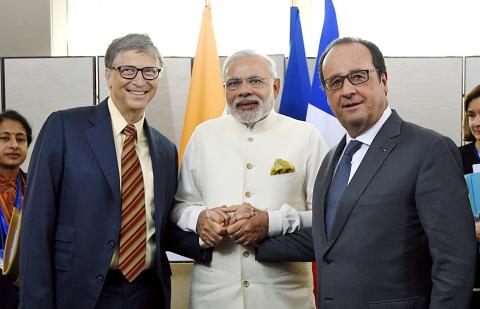Bill Gates, who knows a thing or two about antitrust investigations, does not think it is a good idea to break up the biggest US technology companies as some politicians have suggested.
The Microsoft Corp cofounder and former chief executive battled the US Department of Justice for years in the late 1990s in a bruising antitrust case. At issue was the software giant’s bundling of its Internet Explorer browser to Windows as a way to maintain its dominance in PC operating systems.
Ultimately Microsoft remained intact.

Photo: AP
Two decades later, Microsoft is one of the few big US technology companies not under regulatory scrutiny in Washington.
The US Department of Justice, the Federal Trade Commission, state attorneys general and a congressional committee are all scrutinizing so-called Big Tech — companies from Alphabet Inc‘s Google to Amazon.com Inc and Facebook Inc — that Washington has concluded have gotten too big and too powerful.
US Senator Elizabeth Warren, a Democratic presidential candidate, has made a forceful and detailed plan about how she would go about breaking them up.
Gates disagrees.
“You have to really think; is that the best thing?” Gates said in an interview with Bloomberg TV. “If there’s a way the company’s behaving that you want to get rid of, then you should just say: ‘OK, that’s a banned behavior,’ but splitting the company in two, and having two people doing the bad thing — that doesn’t seem like a solution.”
Microsoft narrowly avoided a breakup when a federal appeals court reversed a lower court ruling ordering the software company to be split.
The company has bounced back to top Apple Inc and Amazon as the stock market’s most valuable company, buoyed by optimism about its cloud business, and on some investors’ belief that Microsoft is a safe haven as US and European regulators sharpen their scrutiny of others in the sector.
Lawmakers, including US Representative David Cicilline, who is leading the House antitrust subcommittee’s inquiry into large Internet companies, has asked them for detailed information about acquisitions, business practices, executive communications, previous probes and lawsuits.
The panel has also asked for information from customers of those big companies, asking about mobile apps, social media, messaging, cloud computing and more.
Virtually every aspect of the companies’ business is under the microscope.
“It’s a pretty narrow set of things that I think breakup is the right answer to,” Gates said. “These companies are very big, very important companies. So the fact the governments are thinking about these things, that’s not a surprise.”
Gates said Microsoft’s own antitrust scrutiny has made the company “more thoughtful about this kind of activity.”
In his view, companies such as Google, Amazon and the rest are “behaving totally legally. They’re doing a lot of innovative things.”

Merida Industry Co (美利達) has seen signs of recovery in the US and European markets this year, as customers are gradually depleting their inventories, the bicycle maker told shareholders yesterday. Given robust growth in new orders at its Taiwanese factory, coupled with its subsidiaries’ improving performance, Merida said it remains confident about the bicycle market’s prospects and expects steady growth in its core business this year. CAUTION ON CHINA However, the company must handle the Chinese market with great caution, as sales of road bikes there have declined significantly, affecting its revenue and profitability, Merida said in a statement, adding that it would

Greek tourism student Katerina quit within a month of starting work at a five-star hotel in Halkidiki, one of the country’s top destinations, because she said conditions were so dire. Beyond the bad pay, the 22-year-old said that her working and living conditions were “miserable and unacceptable.” Millions holiday in Greece every year, but its vital tourism industry is finding it harder and harder to recruit Greeks to look after them. “I was asked to work in any department of the hotel where there was a need, from service to cleaning,” said Katerina, a tourism and marketing student, who would

i Gasoline and diesel prices at fuel stations are this week to rise NT$0.1 per liter, as tensions in the Middle East pushed crude oil prices higher last week, CPC Corp, Taiwan (台灣中油) and Formosa Petrochemical Corp (台塑石化) said yesterday. International crude oil prices last week rose for the third consecutive week due to an escalating conflict between Israel and Iran, as the market is concerned that the situation in the Middle East might affect crude oil supply, CPC and Formosa said in separate statements. Front-month Brent crude oil futures — the international oil benchmark — rose 3.75 percent to settle at US$77.01

RISING: Strong exports, and life insurance companies’ efforts to manage currency risks indicates the NT dollar would eventually pass the 29 level, an expert said The New Taiwan dollar yesterday rallied to its strongest in three years amid inflows to the nation’s stock market and broad-based weakness in the US dollar. Exporter sales of the US currency and a repatriation of funds from local asset managers also played a role, said two traders, who asked not to be identified as they were not authorized to speak publicly. State-owned banks were seen buying the greenback yesterday, but only at a moderate scale, the traders said. The local currency gained 0.77 percent, outperforming almost all of its Asian peers, to close at NT$29.165 per US dollar in Taipei trading yesterday. The